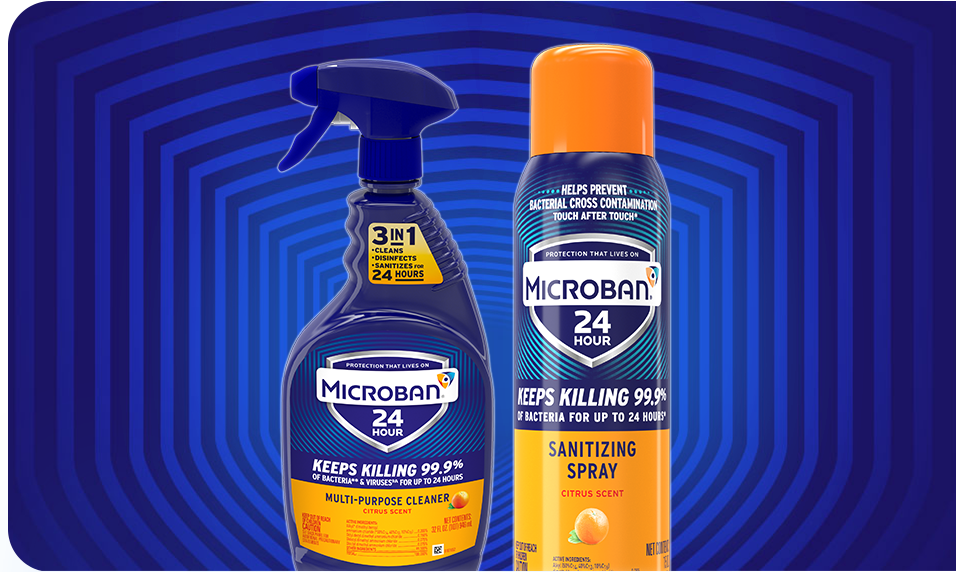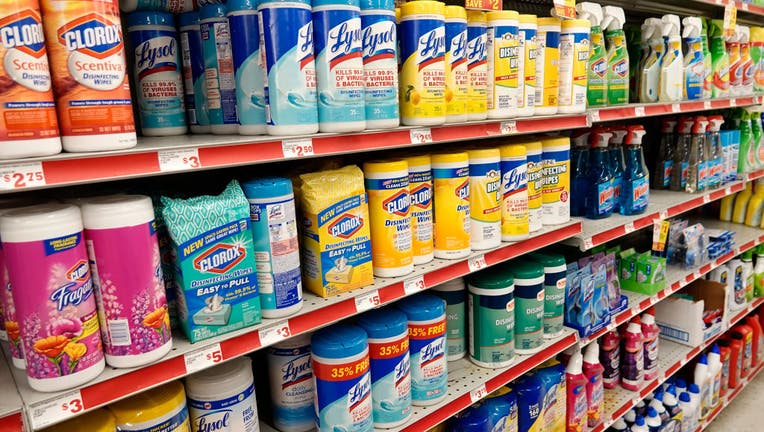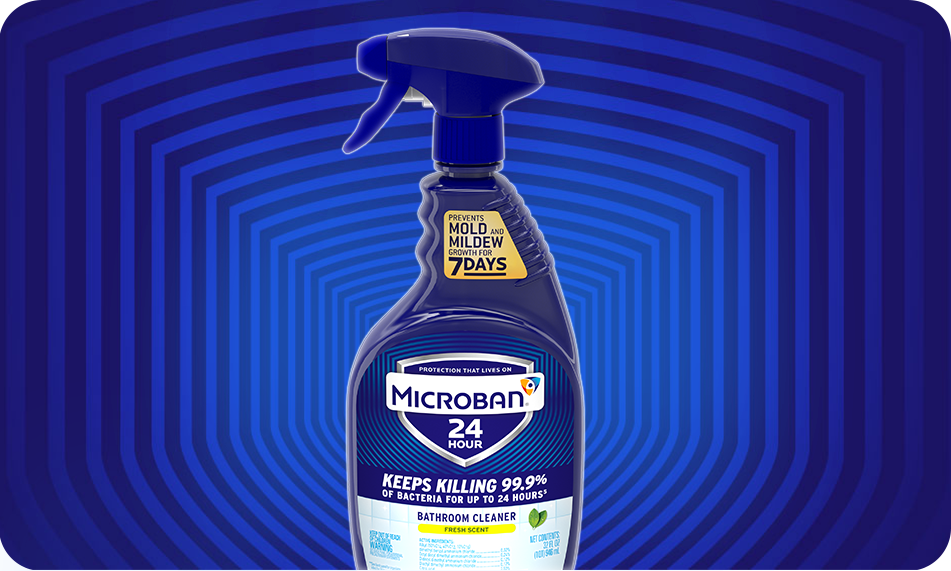Bathroom cleaners can kill coronavirus on surfaces effectively. It is important to use the right products.
In the midst of the ongoing pandemic, one common concern is how to effectively clean and disinfect our living spaces to prevent the spread of the coronavirus. Among the areas that require special attention is the bathroom, a high-traffic area prone to contamination.
Using an effective bathroom cleaner that has been proven to kill the coronavirus is crucial in maintaining a hygienic environment. By understanding the science behind the cleaning products and their ability to combat the virus, we can take proactive steps to safeguard ourselves and our loved ones. Let’s explore the effectiveness of bathroom cleaners against the coronavirus and how we can utilize them to maintain a clean and safe living environment.

Credit: www.microban24.com
How Effective Is Bathroom Cleaner Against Coronavirus?
How effective is bathroom cleaner against coronavirus?
Understanding The Importance Of Disinfection
Proper disinfection is crucial in preventing the spread of viruses, including the coronavirus. Cleaning and disinfecting frequently touched surfaces, such as doorknobs, light switches, and countertops, is essential for maintaining a healthy environment. Bathrooms, in particular, harbor a multitude of germs, making it imperative to use effective cleaning agents to combat the spread of pathogens.
The Role Of Bathroom Cleaner In Killing Viruses
Bathroom cleaners are designed to eliminate various types of germs, bacteria, and viruses, including the coronavirus. These cleaners contain active ingredients such as bleach, hydrogen peroxide, or quaternary ammonium compounds that are effective in destroying harmful microorganisms. When used according to the manufacturer’s instructions, bathroom cleaners can significantly reduce the presence of viruses on surfaces, aiding in the overall effort to maintain a hygienic environment.
Key Components Of A Bathroom Cleaner
Disinfectants
Bathroom cleaners contain disinfectants that are crucial for killing viruses and bacteria.
Surfactants
Surfactants in bathroom cleaners help break down dirt and grime for effective cleaning.
Other Active Ingredients
- Alcohols – Effective against pathogens
- Bleach – Strong disinfectant
- Ammonia – Cuts through grease
- Hydrogen peroxide – Kills germs and stains
Specific Bathroom Cleaners Tested Against Coronavirus
Exploring the effectiveness of specific bathroom cleaners against coronavirus can provide valuable insights into maintaining a clean and safe environment. Here, we delve into the performance of Brand A, Brand B, and Brand C in combatting this virus.
Brand A
- Effective for disinfecting various bathroom surfaces
- Tested and proven to eliminate coronavirus
- Contains ingredients known to kill viruses
Brand B
- Known for its powerful germ-killing properties
- Specifically tested against coronavirus strains
- Recommended by health authorities for virus control
Brand C
- Formulated with antiviral agents for maximum protection
- Successfully demonstrated virus-fighting capabilities
- Highlighted as a reliable defense against coronavirus

Credit: www.fox5atlanta.com
Proper Usage And Tips For Maximum Effectiveness
Using the right bathroom cleaner can be an effective measure against the spread of coronavirus. Understanding the proper usage and implementing the right tips can maximize the effectiveness of the cleaner in safeguarding against the virus.
Using Bathroom Cleaner Correctly
- Read the instructions on the bathroom cleaner carefully to understand the recommended usage.
- Apply the cleaner to surfaces, ensuring thorough coverage, and leave it on for the specified contact time.
- Use a clean cloth or sponge to wipe the surfaces and remove any residue after the contact time.
Tips For High-touch Areas
- Focus on frequently touched surfaces such as doorknobs, faucet handles, and light switches. These areas should be cleaned more often.
- Pay special attention to areas that are often overlooked, such as the underside of toilet lids and the base of faucets.
Frequency Of Cleaning
Establish a regular cleaning routine for all bathroom surfaces using the cleaner. High-touch areas should be cleaned multiple times a day, while less frequently touched surfaces may require cleaning at least once a day. Regular cleaning is essential for maintaining a hygienic environment.
Limitations Of Bathroom Cleaners Against Coronavirus
COVID-19, caused by the coronavirus, has brought about a heightened awareness of cleanliness and disinfection. While using a bathroom cleaner may seem like a logical choice to combat the virus, it is important to understand its limitations. Although bathroom cleaners can be effective in killing certain viruses and bacteria, they may not be equally effective against the coronavirus. In this article, we explore the limitations of bathroom cleaners in effectively eliminating the coronavirus from various surfaces.
Effectiveness On Various Surfaces
Bathroom cleaners are primarily designed to tackle common bathroom surfaces such as sinks, toilets, and tiles. These cleaners are often effective in removing dirt, grime, and certain pathogens. However, when it comes to the coronavirus, their effectiveness may vary depending on the surface.
Smooth and non-porous surfaces like glass or plastic are generally easier to clean and disinfect. Due to their smoother surfaces, coronavirus particles have less opportunity to embed themselves, making it easier for bathroom cleaners to eliminate them.
Porous surfaces such as cloth materials or certain types of upholstery may present a greater challenge. The coronavirus can penetrate into the materials, making it harder for the bathroom cleaner to effectively eliminate the virus. It is important to note that porous surfaces may require additional cleaning methods such as hot water washing or steam cleaning.
Viral Load And Contact Time
The viral load or the concentration of the virus on a surface plays a significant role in the effectiveness of bathroom cleaners against the coronavirus. Lower viral loads are relatively easier to eliminate using regular bathroom cleaners. However, higher viral loads, such as those found in heavily contaminated areas, may require more rigorous cleaning and disinfection protocols.
Contact time, or the duration for which the bathroom cleaner remains in contact with the surface, also affects its effectiveness. It is essential to carefully follow the instructions provided by the manufacturer regarding contact time. Failure to do so may result in inadequate virus elimination.
| Bathroom Cleaner Limitations |
|---|
| Not all bathroom cleaners are formulated to kill coronavirus |
| Effectiveness may vary depending on the surface material |
| Higher viral loads require more stringent cleaning measures |
| Proper contact time is crucial for effective disinfection |
| Porous surfaces may pose a greater challenge for bathroom cleaners |
In conclusion, while bathroom cleaners can be effective in eliminating certain viruses and bacteria, their effectiveness against the coronavirus may be limited. The type of surface, viral load, and contact time are factors that can affect their ability to eliminate the virus thoroughly. It is crucial to use suitable cleaning products and follow the appropriate cleaning protocols to ensure optimal cleanliness and safety.
Additional Precautions For A Healthier Environment
In the midst of the COVID-19 pandemic, it is crucial to take extra precautions to protect ourselves and our loved ones. While using bathroom cleaners to kill the coronavirus is essential, there are additional measures we can implement to maintain a healthier environment. This blog post will explore three vital aspects: hand hygiene, proper ventilation, and regular overall cleaning.
Hand Hygiene
Keeping our hands clean is one of the most effective ways to prevent the transmission of viruses, including COVID-19. The Centers for Disease Control and Prevention (CDC) recommends washing hands with soap and water for at least 20 seconds. Here are some essential hand hygiene practices:
- Wash your hands regularly: Use soap and clean water to thoroughly wash your hands, especially after using the bathroom, before eating, and when you come in contact with frequently touched surfaces.
- Use hand sanitizer: If soap and water are not available, use a hand sanitizer with at least 60% alcohol content. Apply enough sanitizer to cover all surfaces of your hands and rub them together until dry.
Proper Ventilation
Proper ventilation plays a vital role in maintaining a healthy environment, especially when it comes to enclosed spaces like bathrooms. Here’s why it is important:
- Improved air circulation: Good ventilation helps to circulate fresh air and dilute any potential airborne viruses, reducing the risk of transmission.
- Removal of odors: Effective ventilation systems help eliminate unpleasant odors, ensuring a comfortable and more hygienic bathroom experience.
- Reduced condensation: Adequate ventilation prevents excessive humidity and condensation, which can lead to mold and mildew growth.
Regular Overall Cleaning
Regular cleaning of all surfaces within the bathroom is crucial in maintaining a healthy environment. Here are some recommended cleaning practices:
- Use suitable cleaners: Choose a bathroom cleaner that is effective against viruses, such as those containing EPA-approved disinfectants.
- Follow instructions: Read and follow the instructions on the cleaner’s label carefully to ensure proper usage and effectiveness.
- Pay attention to high-touch surfaces: Focus on cleaning frequently touched surfaces like doorknobs, faucets, toilet handles, light switches, and countertops.
- Dispose of cleaning materials safely: Dispose of used cleaning materials properly to prevent cross-contamination.
By prioritizing hand hygiene, proper ventilation, and regular cleaning, we can create a healthier environment in our bathrooms and reduce the risk of virus transmission. It is important to remember that these additional precautions should complement the use of bathroom cleaners in tackling the coronavirus effectively.

Credit: www.tennessean.com
Frequently Asked Questions For Does Bathroom Cleaner Kill Coronavirus
Does Bathroom Cleaner Kill Coronavirus?
Yes, bathroom cleaners with disinfectant properties can effectively kill the coronavirus on surfaces, providing thorough cleaning and following instructions.
How Does Bathroom Cleaner Kill Coronavirus?
Bathroom cleaners contain ingredients like bleach or hydrogen peroxide that actively attack and destroy the outer protective layer of the coronavirus, rendering it inactive and unable to infect.
Which Bathroom Cleaners Are Effective Against Coronavirus?
Bathroom cleaners containing chlorine bleach, hydrogen peroxide, or EPA-approved disinfectants are effective against the coronavirus. Always check product labels and follow instructions for proper usage.
Is It Necessary To Clean And Disinfect The Bathroom Regularly?
Yes, regular cleaning and disinfection of the bathroom are essential to maintain a hygienic environment, prevent the spread of germs, and eliminate potential sources of infection, including the coronavirus.
Conclusion
Using a bathroom cleaner to kill coronavirus is necessary for maintaining a clean and safe environment. It’s important to choose a cleaner that’s proven effective against viruses and follows recommended guidelines for use. Regular cleaning and disinfecting routines can help prevent the spread of germs, including coronavirus, throughout your home.

